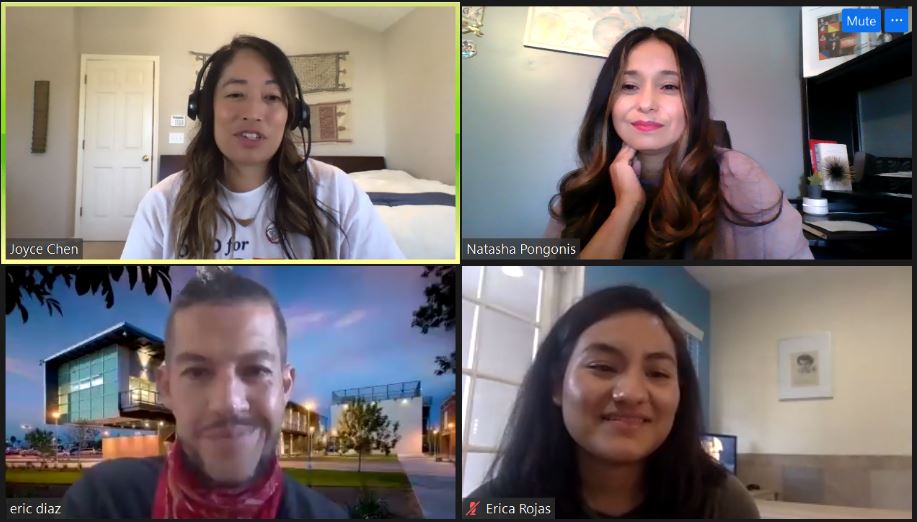Last week Nativa co-founders Natasha Pongonis and Eric Diaz invited Dr. Joyce Chen to be part of the show and share her insights on how working from home has impacted people in the workplace. Specifically, our cohosts wanted to discuss how these recent changes have affected working women. Dr. Chen is a former research assistant at the National Bureau of Economic Research and currently works as an associate professor at Ohio State University.
Below we share the transcribed podcast episode as we interview Dr. Chen. Please check out the resources below, including our videocast, and podcast. Whatever your media consumption preferences, we’ve got you covered. Enjoy!
And if you like what you see, see our recent blog posts here.
Videocast
See the full videocast here:
Podcast
Listen to the full audio here:
Full Podcast Transcription:
Natasha: Welcome to the Nativa podcast Series, where we provide a weekly analysis of the latest topics trending among diverse groups in the United States. I am Natasha Pongonis, co-host of the Native podcast and today I have joining this podcast my co-founder and business partner, Eric Diaz. We have one of our analysts, Erica Rojas, and I’m very excited to introduce our guest, Dr. Joyce Chen. Thank you for joining us today.
Dr. Chen: Thanks for having me.
Natasha: Yea! So last week we did an analysis. We collected a large volume of data from Twitter analyzing conversations and the complexities that minority groups; Blacks, Hispanics, and Asian Americans are experienced during the pandemic. It was very interesting to see the dynamic between primarily females experiencing challenges working from home, taking care of the children in the family, and keeping up with the work. And there were also some positive comments about women’s experience during the pandemic regarding working from home. For example, they feel more creative and perhaps also more productive.
As we were doing this analysis, actually, I came across an NPR interview with you on it Joyce. It really caught our attention. The title was ‘Even the Most Successful Women Pay a Big Price in the Pandemic’. So, we wanted to have the opportunity to have you on the podcast and go over some of what you have experienced, and what you see. You are a new associate professor, at The Ohio State University in Development Economics. You have done a lot of research in the topic. So, I’m going to get started with the first question. Since the quarantine, many companies have switched to remote work. Could this help minimize the gender wage gap since both men and women are expected to perform similar jobs?
Dr. Chen: I definitely think it could. And I think early on in the quarantine, a lot of women were really excited because they had requests for flexible work and remote work turned down in the past. And so, the quarantine was really kind of like a reset where all managers could see actually that this functioned pretty well, that employees were on task getting their work done. That face to face interaction, you know, while beneficial, was not essential, and certainly wasn’t essential on a regular basis. And so I think that gave women a lot more flexibility in terms of when they worked and when they could be with their kids. So you could now do something in the middle of the day and there was less emphasis put on that kind of face time that we often see in office settings where people expect you to be there at your desk or at the water cooler or whatever it is from 8 to 5 or longer if you’re really committed. But that got taken away with the possibility of remote work. So I think that will help women for sure.
Natasha: So during our O.Y.E. research we found that many women are expressing the challenges of working from home, taking care of children, etc. Do you think that this could impact the preference of males or females for employers? What do you think will be the preference moving forward? Let’s say assuming the pandemic will be under control in the upcoming months and you have had the option to either stay home or go back to the workplace. Do you see them discriminating between gender preference?
Dr. Chen: Yes, definitely. I think it’s going to depend on how much school and child care can return to normal and how quickly. Because we’ve already seen between August and September that there were 865,000 women that dropped out of the labor force compared to about 215,000 men. So folks are already calling this a ‘she-cession’ where it’s really women who are picking up a lot of the caregiving, in part because maybe that was their role to begin with. In part because oftentimes they’re the lower-earning spouse within a couple. And even those who don’t drop out, I hear lots of stories of women stepping back, not taking on projects, not taking on collaborations, maybe not going for a promotion that they otherwise would have because there are so many demands at home.
So, I definitely think we’re going to see that ripple out for the next several years. And then the other thing, perhaps for women is that face to face. There’s a lot of networking and mentoring that occurs and because women tend to have smaller professional networks to begin with, not being face to face can make that even more of a challenge. So, you don’t have folks to help you through the problems at work or direct you towards good opportunities.
Eric: Dr. Chen, I have a question that hits close to home for me. I have a fiancé that’s expecting. And for somebody that is in a position like that, trying to find a new job in the age of a pandemic and then having childcare responsibilities. I’m curious if you have seen anything in your research about how women are going about that? Are there any changes with the way women are planning for their families while trying to balance the job as well?
Dr.Chen: Yeah, I think in that respect, we’re definitely seeing that kind of ‘K shape’ that folks have been talking about in terms of recovery. Where there are a lot of women who don’t have those choices and don’t have the flexibility to stop working and stop earning money. And so they’re having to make do with all kinds of arrangements that they cobbled together on the fly. I think of friends and neighbors, and then we also have higher income folks who form pods and get tutors and pay for special accommodations for their kids. One thing that will be interesting I think, is I hear more and more about jobs that are advertised for any location now because it’s all remote work. So that will be interesting because I think women have been, and are more likely to, be restrained by the location of their spouse’s job. They’re sort of trailing the spouse. So now that we’ve opened up more opportunities where you can work from anywhere, that might be a good option.
Eric: That’s a good point, there are so many companies to potentially choose from. And Erica, you found some of this in your research, I believe, correct? And Im sure for certain companies that say, “Now we’re 100% working from home.” So now maybe you can say, “Oh, I could go work for Twitter. I could do it from my bedroom.” And that is a great opportunity for somebody that doesn’t live in San Francisco. So it’ll be interesting to see.
Dr. Chen: Yes, the other interesting thing that I’ve heard is that they are struggling with how to adjust the salaries of existing employees, for those firms based in Seattle, San Francisco, etc that have a really high cost of living. If they find that their employees have moved out of that area, there is actually some effort to take their salaries down to match the cost of living where they’re currently located.
Eric: Nobody likes that. At least no employee likes that! But it makes sense, I get it.
Erica: So, based on your experience and research, do you think the rate of women dropping out of the workforce will increase, decrease, or stay the same within the next one or two years? Why do you think that?
Dr. Chen: My guess is that it will still increase for a while. I think it is really going to be very dependent on schools, daycares, and even nursing homes. To the extent that caregiving can move out into to the sense that you could hire people to do caregiving for you, right? I think that will help women stay in the labor force. That’s how we’ve always done it. And unfortunately, I think that’s still how employers treat it. They still feel like it’s your choice. You have caregiving duties and you figure it out. But when all those options were taken away, there was nothing for women to fall back on.
So I think it will continue as long as those caregiving options are limited. It may take a while to bounce back because you do get penalized for gaps in your work history as we know, when you take a break and it’s not explained. So we’ll see if employers find this to be a sufficient explanation for a gap or not.
Erica: Right. So during the pandemic, there’s been so many new innovations. During these times there have been many remote innovations from companies and employees alike. With new ideas rising, could this potentially increase the job market for women who prefer to stay at home after the pandemic? Can you share a little bit about your ideas or experiences that you’ve had?
Dr. Chen: Yeah, I think it definitely could. Like I mentioned early on, right, I think it’s been very welcome for women to see, for employers to see that flexible work really is feasible. To be honest there are probably a lot of employees who can get all of their tasks done in less than a full workday. In most cases having that flexibility to not have to sit there at your desk is great! I think, especially for those who have caregiving responsibilities.
But I do think with more remote work, we’re going to have to really address this issue of caregiving and work-life balance, right? That’s one thing I’ve heard from a lot of people is that with caregiving duties or not, is that work and life just completely bleed together now. Your computer is there, you know, I work in my bedroom, right? So you just feel like you’re always on. People have a hard time turning off and telling other people that they’re off, right? So I think that collectively, we’re going to have to come to some understanding of what boundaries look like when we work remotely.
Erica: Now that many employees are working from home, do you think women have more avenues to outperform in their roles? Are there certain job roles that maybe could best fit women during this current situation?
Dr. Chen: Yes, I think that could be potentially, to the extent that there’s more flexibility. I think women are oftentimes looking for more flexible work options. So that could be a plus but it remains to be seen. Sometimes it’s hard for women to interact with men and vice versa. So it will be interesting to see how that changes with everything being remote, whether it’s going to be harder for women to be heard. I think it’s hard for a lot of people to be heard on a zoom setting because people talk over each other. And it’s hard to see the visual cues that we might get otherwise. Then the mentoring piece, I think it will be more of a challenge for women because again they’re more likely to be disconnected from professional networks and are less well-connected to those professional networks.
I know that we hear stories of women oftentimes being tasked with doing little things around the workplace, right? Organizing a card for somebody’s birthday or retirement celebration planner. All of those little things that take up time in your day and take away from your work but don’t really count for anything, right? That nobody recognizes or gives you a raise or promotion for those things. We might see that ease up a little bit, which could be nice.
Eric: Let’s talk a little bit about some of the things that you saw in your research and maybe we can compare. So Erica, from some of the research that you found, you saw a lot of discussions about people talking about both challenges and opportunities for working from home, right? Can you just share, maybe a couple of things about what you noticed from when you were researching conversations via Twitter?
Erica: Yes we did see the complexities of having the right work environment while working from home. We look at the perspective from a mother of a student or an associate working for a company. So, in terms of preparing the work, setting the environment, I figured that has been a big issue during this quarantine. Can you share a little bit about that or expand on what your experience has been or how we can deal with that during this quarantine?
Dr. Chen: Yes, that’s a really interesting issue, too, because as you say, space is a big challenge. Finding your own space where you can work uninterrupted. Sharing space, sharing broadband, where now everybody’s on a zoom all the time. At the same time has been a challenge. And workplaces, from what I’ve seen, have not done a great job at stepping up and supporting work from home. They have been OK on the equipment side, but I haven’t seen support for anything beyond that. “Okay, we can give you a computer and a monitor. But other than that, you’re sort of on your own.”And it’s hard to work from your home when there are other people there. Even if it’s not kids, even if it’s your spouse or a dog or whatever there are always more distractions.
It’s harder to be focused and I find personally that, with my kids, I have a hard time saying no to them, right. If they just want to talk or something, they stick their head in and say, “Hey, Mom”. It’s really hard for me to say I’m trying to work right now. Because you have all this guilt, right? I know that they’re not getting what they need. And even with co-workers, I know that everybody is struggling. Everybody needs interaction. It’s hard to break away from those things and stay focused on work.
Natasha: You know, yesterday I was in another zoon meeting and my kids walked into the room and she was asking for help. And it’s something that now we all understand, right? You work, but at the same time, you also have to support your family, and I think that experience made me a little bit more tolerant and perhaps more understanding. The work is important, but you also have to be there for your family. So I think, looking back, hopefully, we will be able to see the positive of how the pandemic allowed us to be a bit more kind and understand that there are so many other priorities as well.
We really thank you, Dr. Chen, for your time. This has been absolutely great to hear your input and your experience. We’re very honored to have you on our podcast and we look forward to perhaps having you in another interview later on.
Dr. Chen: It has been great, thank you so much for inviting me! Thank you.
About Dr. Chen: Dr. Joyce Chen is an Associate Professor in Agricultural, Environmental, and Development Economics at The Ohio State University. Her interests are in development and labor economics, specifically migration, household bargaining and human capital. Her research focuses on the complex relationships between migration, climate change, economic development, and the intra-household allocation of resources.





